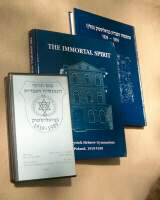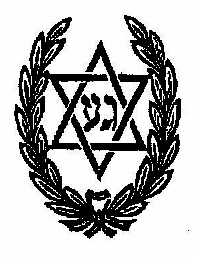1939-1941
Page 141
The abrogation of the Non-Aggression Treaty between Germany, Poland,
and England, became known to the Gymnasium students during the long
lunch break. A few 12th grade students hurried to a friend's apartment
in Sienkiewitz Street and heard Hitler's declaration of the abrogation
of the Treaty. They heard the response of Polish Foreign Minister
Alexander Beck on the radio in the school hall, together with all the
students. "Poland will not allow Germany to seize its land", said Beck
with Polish pride. On 1 September 1939, the Nazi army invaded Poland
and also reached Bialystok. On the 22nd. of that same month, the
Germans left Eastern Poland (they would return two years later), and
the Red Army occupied it in accordance with the Ribbentrop-Molotov
Pact. Bialystok's appearance changed overnight. Here is the
eyewitness account of one of its residents, Shmuel Soltz: "Now
Bialystok was full of refugees who had fled from the west. There was
not a house, or even a corridor, which did not contain refugees.
Before the war, Bialystok had ninety thousand inhabitants, to these
were now added a quarter of a million refugees. It was difficult to
obtain food, medicine, and most of all find a place to live. The
Community Council and its Chairman, Barash, organized the opening of
soup kitchens. The clinics and hospitals were full to overflowing with
sick people. Every day we would hear of arrests, particularly of
owners of factories and businesses, and community activists. The
threat of arrest hung over everyone.
We knew not what the morrow would
bring, what new orders and new decrees". Educational establishments
were numbered, the Gymnasium in Sienkiewitz Street was given the name
"Die Ninete Shule" (the Ninth School), and its teaching language was
immediately changed to Yiddish. Already, By the following year, the
language of tuition had become Russian. Teaching in Hebrew was
forbidden, and also speaking Hebrew was considered to be an offence.
It was a black day for Moshe Zabludowski when he entered the classroom
and said to his pupils: "From today, we will only speak Yiddish".
Chaya Chazan remembers: One day, before the Red Army entered
Bialystok, the former gymnastics teacher, the German Bendorf, warned
his friend David Rakowitzki: "Flee for your life, the Russians will
certainly arrest you". Chaike Grossman recalls that she and her friend
Rachel Orlinski told Rakowitzki one night that he must escape
immediately. Rakowitzki knew that he had an "unsavoury past", in that
he was a Hebrew teacher, the principal of a Hebrew educational
institution, and a representative of the Keren Kayemet Le'Israel
(Jewish National Fund). His daughter was very ill, but he had no
choice. After much wandering and hardship, he and his family reached
Eretz Yisrael. He came to Eretz destitute, but not as a stranger. He
had come home. His ex-pupils came to his aid, and members of the
education department of the Yishuv (Jewish Community in Palestine) knew
who he was. Shortly after his arrival, he was appointed as principal
of a high school in Tel-Aviv.
Daniel Albeck tells of the dramatic
meeting Rakowitzki had with representatives of the new regime before he
escaped. The Soviets wanted to make a pretence of being democratic and
tried to stage-manage the agreement of the teachers and the principal
to their decrees. The senior students and their parents were summoned
to a meeting. The authority representatives made speeches in praise of
the alteration of the teaching language and the transition from
reactionary to progressive education, and then Rakowitzki was invited
to the podium. The principal stood facing the local government
representatives and members of the secret police who were sitting in
the front rows, and said: "You can force us to do anything, but you
will never receive our voluntary consent to change the face of the
Gymnasium and erase its Hebrew and Zionist image".
There was uproar in
the hall. The men from the secret police climbed onto the podium, but
Rakowitzki had already slipped away through a side door. The
stage-managed consent was not given.
Dr. Shimon Dattner recalls: Moshe Zabludowski, Franca Horowitz, and
Chaim Welger received notices of dismissal from the "Ninth School"
because of an article which appeared in a local newspaper - "Der
Bialystoker Stern". The author of the article dared to criticize the
attitude of the new authorities to the schools which had been Hebrew
ones before the occupation. The three of them found employment in
other schools. Several students from the 1939 graduate year were
deported to Russia, and those who were tainted with being "bourgeois"
were exiled to Siberia. Naomi Dzivack recalls: "The Gymnasium
students who were deported to Russia and Siberia stayed alive. None of
those who remained in Bialystok and were shut up in the Ghetto,
survived". Rachel Kalisher (Kaplanski) The Gymnasium During the Soviet
Period (1939-1941)
The name of the institution was changed to "The Ninth School". The
teaching language was Yiddish. Hebrew was banned. Hebrew words used
in Yiddish such as: Ganav (thief), Hatunah (wedding), Emet (truth)
etc. were written phonetically in the Yiddish pronunciation. We, the
students, regarded this with scorn: this is what their "truth" looks
like. The portraits of important national figures on the walls of the
hall on the top floor disappeared, and were replaced by Soviet pictures
and slogans. In the centre, hung a large photograph of Stalin, hugging
a smiling girl holding flowers, to illustrate how happy children were
in the Soviet Union. A Jewish teacher from Minsk (I forget her name)
was made director in charge of the curriculum. One day she brought a
song to the class in praise of Comrade Stalin, which had been written
by a poet from one of the Asiatic Republics. She told us of the
tremendous love which all the peoples of the Soviet Union feel for the
great leader, full of goodness and kindness, the guiding star of the
nation. See how your lot has improved, she said, since you were freed
from the yoke of the Polish Panowie (masters). You had the great
privilege to live in a country which has been liberated by the Red
Army, inspired by Stalin. To prove her point, she read the poem, which
confirmed her claim, and even embellished it.
We, the students, in our accustomed manner from the period before the
"liberation", expressed our critical opinion of the poem, and one of
the students even dared to disqualify it and claimed that it contained
an exaggeration: Stalin is portrayed as an ideal figure, completely
pure, but in reality people like this do not exist. Why, even the
heroes of the Bible, Moses and David, who are admired by everyone, also
sinned. The teacher's face reddened and she became confused, she was
apparently unaccustomed to criticism. She fidgeted nervously with her
handkerchief, silenced us, and said: Everyone, pay attention! With
all this confusion we will never be able to reach any conclusions, we
won't go into this question right now. Tomorrow, I will explain the
significance of the poem and what the author's intentions were. And
indeed, the following day the teacher addressed us. One of the
students, who concealed a book of literary criticism under the desk,
followed her lecture, in which, word for word, she quoted by heart from
the book. This occurred during the first few days of the school year.
After a while, we realized that if we valued our lives and freedom, we
had better remain silent. The shelves in the Gymnasium Library were
always full of books in Hebrew and in Polish, but now all the Hebrew
books were destroyed. They were burnt. In the depths of night, a few
students stole to the site of the bonfire. They were my brother
Abraham Kaplanski, Eliezer (Lazerke) Lipkes, and Hanoch Poczebutzki.
They raked amongst the piles of ashes and removed a few scorched books
which had not been consumed. I remember Abraham returning home,
blackened with soot, with books hidden under his coat: "Perhaps these
books will bear witness to the crimes perpetrated by the Soviets
against the treasures of Hebrew culture", he said. Teacher Moshe
Zabludowski, whom the students called Moishele, once met my brother in
Sienkiewitz Street. In response to his pupil's greeting he winked
slyly, and hinted that my brother should follow him into the
schoolyard. With a gentle smile and trembling voice he whispered in
his ear: "Kaplanski, we must still speak Hebrew in secret". He
glanced about him and added, "Be careful. You can never tell. Maybe
we are being followed". On the eve of Passover, Munkatch the
principal, who spoke fruity Yiddish, came into our class and said to
us: "Lads, you are probably excited about the Passover Seder, I can
read your thoughts. You would like to sit at the table on the evening
of the festival and read: 'Once we were slaves to Stalin in the
U.S.S.R." There was dead silence in the class, and then the principal
laughed sarcastically and said, "A macke farn veln" (some hope - forget
it!). It will never happen. You are going to spend the rest of your
lives under Soviet rule".
|





